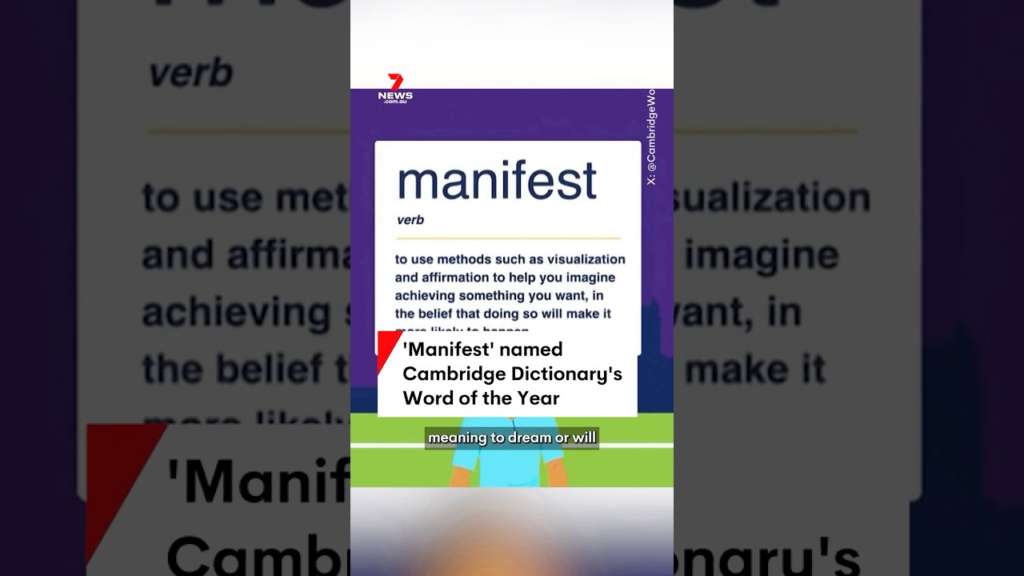In 2024, the Cambridge Dictionary declared “manifest” as its Word of the Year, reflecting a profound shift in cultural and linguistic trends. This word, steeped in history and spiritual connotations, has captured the zeitgeist, transitioning from self-help circles to mainstream media and social platforms.
The increasing popularity of manifesting as a concept illustrates both the power of positive thinking and the potential pitfalls of unscientific beliefs. Let’s delve deeper into why this word was chosen, its historical journey, and its broader implications in modern society.
The Rise of “Manifest” in Modern Culture
This word has seen a significant surge in usage, especially on platforms like TikTok, where billions of views revolve around manifesting success, wealth, and love.
Influential figures, including celebrities such as Dua Lipa, Gabby Thomas, and Ollie Watkins, have spoken openly about their success stories linked to manifesting. This trend underscores a broader cultural fascination with the idea that positive thinking can shape reality.
This word gained traction during the pandemic, a period marked by uncertainty and a collective search for control. Many turned to practices like the “3-6-9” method, which involves writing down desires repeatedly throughout the day, believing it would bring those dreams to fruition. This ritualistic approach offered a sense of agency in a chaotic world, despite lacking scientific validation.
Read : AI-Powered Jesus Introduced at St. Peter’s Church to Hear Confessions
Psychologists caution against conflating manifesting with genuine positive thinking. Dr. Sander van der Linden, a social psychologist at Cambridge University, points out that this word falls into the category of “magical thinking.”
This belief in the power of mental rituals to alter reality can lead to unrealistic expectations and disappointment. While setting goals and maintaining a positive mindset are proven strategies for success, expecting outcomes solely based on thoughts is a different, unproven philosophy.
The Historical Evolution of “Manifest”
The word “manifest” boasts a rich, 600-year history, illustrating how language evolves to reflect societal changes. Its earliest recorded use dates back to the 14th century, when Geoffrey Chaucer described something “manyfest” as easily noticeable or obvious. This original meaning still holds today when we talk about something manifesting itself—be it symptoms of an illness or a company’s decline.

In the mid-19th century, the term “manifest destiny” emerged in American politics, symbolizing the belief that the United States was destined to expand across North America. This phrase underscored a sense of inevitability and divine right, aligning with the broader meaning of making something clear or evident.
The verb form, meaning to show something clearly through actions or signs, has persisted in literature and everyday usage. For example, dissatisfaction might this word in various ways, from verbal complaints to financial repercussions. This adaptability highlights the word’s enduring relevance and flexibility in different contexts.
The related noun “manifesto” also shares this linguistic lineage. A manifesto is a written declaration of beliefs, aims, and policies, often associated with political movements.
In 2024, with major elections taking place globally, from the United Kingdom to India, the term gained renewed significance. Political parties laid out their visions and promises in manifestos, seeking to make their agendas clear to the public.
Implications and Future Trends of “Manifest”
The popularity of this word in 2024 is more than a linguistic trend; it reflects deeper societal currents. The rise of manifesting speaks to a collective desire for control and self-improvement in an uncertain world. However, this trend also raises important questions about the intersection of psychology, social media, and popular culture.
Psychological Implications: While the concept of manifesting can offer motivation and hope, it also carries risks. Believing that one can achieve success merely through thoughts can lead to neglecting the hard work and practical steps necessary for real change. Moreover, the idea that diseases or hardships can be wished away promotes a dangerous narrative, potentially discouraging individuals from seeking medical help or taking responsibility for their actions.

Social Media Influence: Platforms like TikTok have amplified the spread of manifesting culture, often blurring the lines between inspiration and pseudoscience. The viral nature of these trends means that unproven ideas can reach millions within hours. Celebrities endorsing manifesting add to its allure, making it seem like a shortcut to success. However, the reality is more nuanced. Genuine achievement requires effort, resilience, and sometimes, the acceptance of failure.
Linguistic Trends: The evolving meaning of this word demonstrates how language reflects societal shifts. As new technologies and ideas emerge, words take on new connotations. The Cambridge Dictionary’s role in tracking these changes helps us understand not just language, but also the cultural and social forces shaping our world. The addition of related terms like “manifest destiny” and “manifesto” to the conversation underscores the word’s versatility and depth.
Other Notable Words of 2024
The declaration of this word as the Word of the Year is part of a broader effort by the Cambridge Dictionary to capture the linguistic zeitgeist. Other terms that saw spikes in lookups this year include:
- Brat: Popularized by Charli XCX’s album, this term reclaimed and redefined the idea of rebellion, especially among women rejecting social expectations.
- Demure: Satirical uses of this word highlighted the ongoing discourse around gender roles and societal expectations.
- Goldilocks: This term, used to describe situations that are “just right,” gained traction in economic discussions, particularly in describing India’s balanced growth and inflation.
- Ecotarian: Reflecting a growing interest in sustainability, this term describes individuals committed to environmentally conscious eating.
Emerging Words and Future Entries
Language is constantly evolving, and new words are continually being tracked by lexicographers. Some of the emerging terms that may find their way into future editions of the Cambridge Dictionary include:
- Quishing: A form of phishing that involves QR codes, reflecting new cybersecurity threats.
- Resenteeism: Describing the phenomenon of employees who continue to work while feeling deeply resentful, a trend exacerbated by remote work and changing workplace dynamics.
- Gymfluencer: Influencers focusing on fitness, highlighting the intersection of social media and wellness culture.
- Vampire Devices: Appliances that consume power even when not in use, underscoring growing concerns about energy efficiency.
The selection of this word as the Cambridge Dictionary Word of the Year for 2024 is more than a linguistic milestone; it’s a window into contemporary culture. From its historical roots to its modern resurgence, this word encapsulates our collective hopes, challenges, and the ongoing quest for meaning in an unpredictable world.
As we navigate the complexities of modern life, understanding the power and limitations of ideas like manifesting can help us strike a balance between aspiration and realism.

